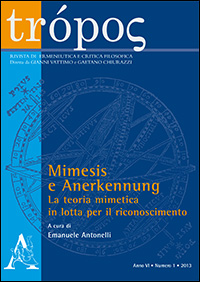Kant's Aesthetics of the Sublime and Politics of Emancipatory Temporality
DOI:
https://doi.org/10.13135/2036-542X/7794Keywords:
Sublime, Temporality, Imagination, Emancipation, EventAbstract
The main purpose of this work is to present and argue ontological and political significance of the concept of the sublime analyzing Kant's aesthetics exposed in his Third Critique. In the first part of the paper we will lay stress upon the temporal structure of the Kantian sublime. In order to see how notion of the sublime reflects the radical reversal in the structure of time, we will lean on Deleuze's reflections on Kant and raise the following question: is not the experience of the sublime based upon reflection of the form of the subject, namely, the form of its inner sense - time? In the second part of this work more political issues will come forward through Slavoj Zizek's interpretation of Kant and Alain Badiou's work on revolutionary historical riots. The political actuality of the sublime is expressed in the following question: Can revision of the aesthetics of the sublime give an important contribution to the political theory of emancipation?


